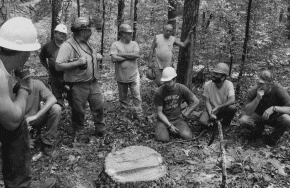Green Horizons
Volume 15, Number 3Summer 2011
Josh Stevens, Missouri Forest Products Association
Would you like to hire a logger who is safe? Would you like to hire a logger with advanced cutting skills? Did you know that there are loggers available that have completed a training program in safe and efficient logging practices?
 |
| Professional Timber Harvester trainer Joe Glenn (in safety vest) discusses cutting technique with a group of loggers at a training at Peck Ranch in July 2011. |
The Missouri Forest Products Association, with assistance from the Missouri Department of Conservation, has offered a training certification program to timber harvesters since the late 1990's. A professional trainer with extensive experience provides instruction on advanced cutting techniques that improve personal safety and protects the standing timber in your forest from excessive damages. Timber harvesters greatly appreciate the new skills they learn in the class, and many 'old-time' cutters are impressed with their new-found knowledge.
Timber harvesters also learn about forest management and techniques for preventing soil erosion in the woods. Once the initial training has been completed graduates are awarded a certificate and can renew it every year by attending an advanced class.
Advanced classes range in topics from insect and disease issues to lumber grading, skidder operations and advanced soil erosion prevention techniques. The Missouri Department of Conservation requires loggers working on state property to hold the Professional Timber Harvesters Certification. There are many loggers in southern Missouri who hold the certificate, but less timber and less state land north of the river means there are less certificate holders there.
The training is offered to improve the quality of Missouri's timber resource and protect our soils and water from excessive runoff. A trained workforce ensures that loggers have the skills and know-how to accomplish this goal. The training also protects loggers, as many of the new cutting techniques they learn are safer than those that we all grew up with.
The techniques I learned in the class have changed the way I cut, and I haven't gone back to my old ways. My experience is similar to most everyone that completes the certification. I can now cut trees that I would have walked away from before because I considered them out of my skill range. I can also cut lower on the tree more safely, providing me comfort and the ability to harvest more of the log.
Directional felling is taught and is critical to protecting surrounding trees so they don't get large branches knocked out of their canopy or the main stem roughed up. In the training we choose a target by dropping a piece of flagging on the ground and are taught to hit the target. One's confidence improves when they can show their colleagues that they can precisely aim a tree and drop it where they said they would. Directional felling also reduces damage to the standing timber because the skidder will have an easier time dragging the log out of the woods if placed appropriately.
The Missouri Forest Products Association provides an upto- date listing of certified Professional Timber Harvesters on its website that can be found at: http://www.moforest.org/loggers/index.php
Anyone interested in completing the training is encouraged; it's not just for loggers. Landowners, caretakers, foresters, volunteers and municipal and electric distribution workers have attended to improve their forest resource and skills. To learn more about the program call Josh Stevens at 573-634-3252 or email at josh@moforest.org.